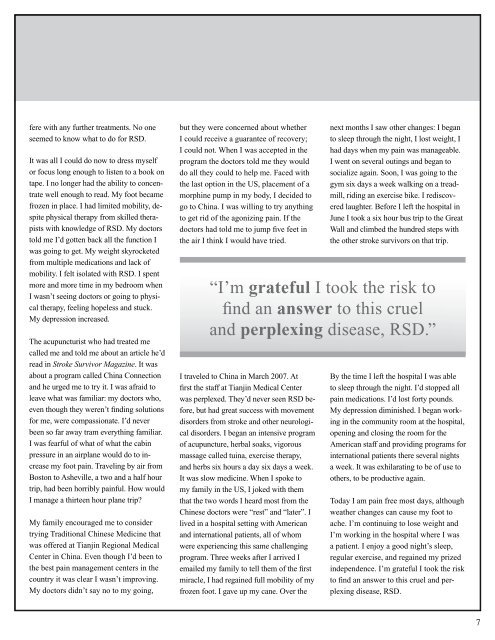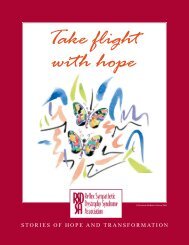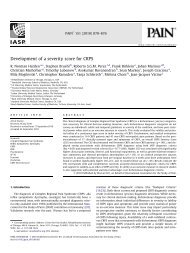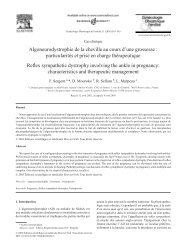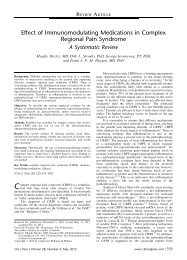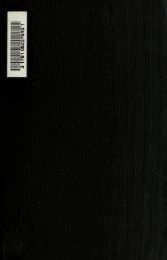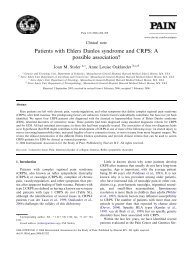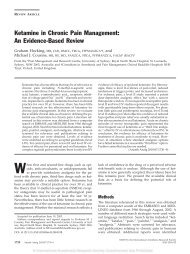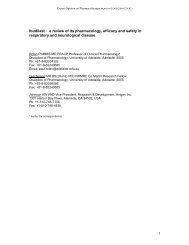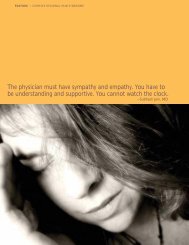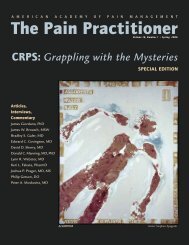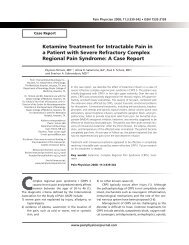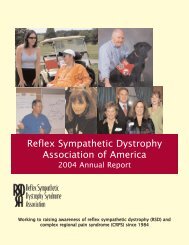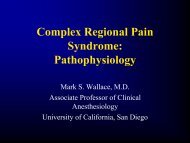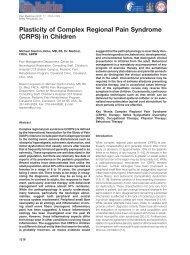thank you! - Reflex Sympathetic Dystrophy Association of America
thank you! - Reflex Sympathetic Dystrophy Association of America
thank you! - Reflex Sympathetic Dystrophy Association of America
You also want an ePaper? Increase the reach of your titles
YUMPU automatically turns print PDFs into web optimized ePapers that Google loves.
fere with any further treatments. No one<br />
seemed to know what to do for RSD.<br />
It was all I could do now to dress myself<br />
or focus long enough to listen to a book on<br />
tape. I no longer had the ability to concentrate<br />
well enough to read. My foot became<br />
frozen in place. I had limited mobility, despite<br />
physical therapy from skilled therapists<br />
with knowledge <strong>of</strong> RSD. My doctors<br />
told me I’d gotten back all the function I<br />
was going to get. My weight skyrocketed<br />
from multiple medications and lack <strong>of</strong><br />
mobility. I felt isolated with RSD. I spent<br />
more and more time in my bedroom when<br />
I wasn’t seeing doctors or going to physical<br />
therapy, feeling hopeless and stuck.<br />
My depression increased.<br />
The acupuncturist who had treated me<br />
called me and told me about an article he’d<br />
read in Stroke Survivor Magazine. It was<br />
about a program called China Connection<br />
and he urged me to try it. I was afraid to<br />
leave what was familiar: my doctors who,<br />
even though they weren’t finding solutions<br />
for me, were compassionate. I’d never<br />
been so far away tram everything familiar.<br />
I was fearful <strong>of</strong> what <strong>of</strong> what the cabin<br />
pressure in an airplane would do to increase<br />
my foot pain. Traveling by air from<br />
Boston to Asheville, a two and a half hour<br />
trip, had been horribly painful. How would<br />
I manage a thirteen hour plane trip?<br />
My family encouraged me to consider<br />
trying Traditional Chinese Medicine that<br />
was <strong>of</strong>fered at Tianjin Regional Medical<br />
Center in China. Even though I’d been to<br />
the best pain management centers in the<br />
country it was clear I wasn’t improving.<br />
My doctors didn’t say no to my going,<br />
but they were concerned about whether<br />
I could receive a guarantee <strong>of</strong> recovery;<br />
I could not. When I was accepted in the<br />
program the doctors told me they would<br />
do all they could to help me. Faced with<br />
the last option in the US, placement <strong>of</strong> a<br />
morphine pump in my body, I decided to<br />
go to China. I was willing to try anything<br />
to get rid <strong>of</strong> the agonizing pain. If the<br />
doctors had told me to jump five feet in<br />
the air I think I would have tried.<br />
I traveled to China in March 2007. At<br />
first the staff at Tianjin Medical Center<br />
was perplexed. They’d never seen RSD before,<br />
but had great success with movement<br />
disorders from stroke and other neurological<br />
disorders. I began an intensive program<br />
<strong>of</strong> acupuncture, herbal soaks, vigorous<br />
massage called tuina, exercise therapy,<br />
and herbs six hours a day six days a week.<br />
It was slow medicine. When I spoke to<br />
my family in the US, I joked with them<br />
that the two words I heard most from the<br />
Chinese doctors were “rest” and “later”. I<br />
lived in a hospital setting with <strong>America</strong>n<br />
and international patients, all <strong>of</strong> whom<br />
were experiencing this same challenging<br />
program. Three weeks after I arrived I<br />
emailed my family to tell them <strong>of</strong> the first<br />
miracle, I had regained full mobility <strong>of</strong> my<br />
frozen foot. I gave up my cane. Over the<br />
next months I saw other changes: I began<br />
to sleep through the night, I lost weight, I<br />
had days when my pain was manageable.<br />
I went on several outings and began to<br />
socialize again. Soon, I was going to the<br />
gym six days a week walking on a treadmill,<br />
riding an exercise bike. I rediscovered<br />
laughter. Before I left the hospital in<br />
June I took a six hour bus trip to the Great<br />
Wall and climbed the hundred steps with<br />
the other stroke survivors on that trip.<br />
“I’m grateful I took the risk to<br />
find an answer to this cruel<br />
and perplexing disease, RSD.”<br />
By the time I left the hospital I was able<br />
to sleep through the night. I’d stopped all<br />
pain medications. I’d lost forty pounds.<br />
My depression diminished. I began working<br />
in the community room at the hospital,<br />
opening and closing the room for the<br />
<strong>America</strong>n staff and providing programs for<br />
international patients there several nights<br />
a week. It was exhilarating to be <strong>of</strong> use to<br />
others, to be productive again.<br />
Today I am pain free most days, although<br />
weather changes can cause my foot to<br />
ache. I’m continuing to lose weight and<br />
I’m working in the hospital where I was<br />
a patient. I enjoy a good night’s sleep,<br />
regular exercise, and regained my prized<br />
independence. I’m grateful I took the risk<br />
to find an answer to this cruel and perplexing<br />
disease, RSD.<br />
7


